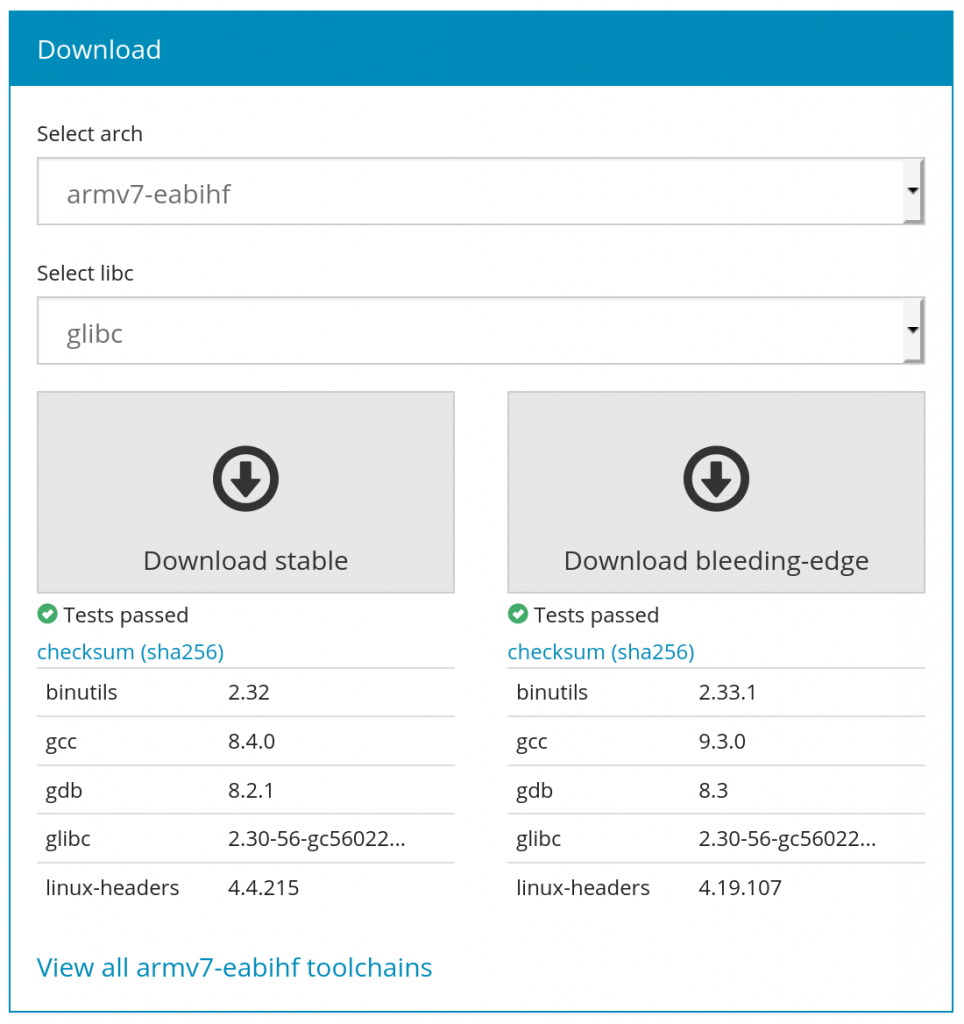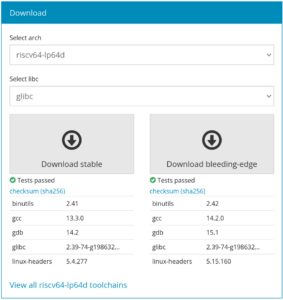 We just released version 2024.05 of the Bootlin toolchains, a set of 220 freely available pre-compiled cross-compilation toolchains, targeting a wide range of CPU architectures, with support for the 3 major C libraries used in the embedded Linux world: glibc, uClibc-ng and musl.
We just released version 2024.05 of the Bootlin toolchains, a set of 220 freely available pre-compiled cross-compilation toolchains, targeting a wide range of CPU architectures, with support for the 3 major C libraries used in the embedded Linux world: glibc, uClibc-ng and musl.
Tag: toolchains
Bootlin toolchains 2024.02 released
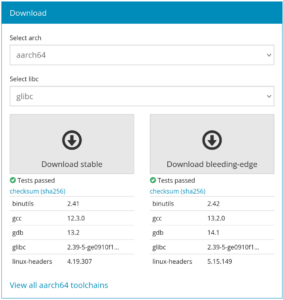 We just released version 2024.02 of the Bootlin toolchains a large set of freely available pre-compiled cross-compilation toolchains targeting a wide range of CPU architectures and configurations.
We just released version 2024.02 of the Bootlin toolchains a large set of freely available pre-compiled cross-compilation toolchains targeting a wide range of CPU architectures and configurations.
Compared to the previous 2023.11 toolchains, the main changes are:
- The stable toolchains are now built with Binutils 2.41, and the bleeding-edge toolchains are built with Binutils 2.42
- The stable toolchains are now using Linux kernel headers 4.19, and the bleeding-edge toolchains are using Linux kernel headers 5.15
- The glibc toolchains are now using glibc 2.39
- The musl toolchains are now using musl 1.2.5
- Thanks to the musl update, the RISC-V 32-bit toolchains are now also offered in a musl variant
As usual, all toolchains are available for download from https://toolchains.bootlin.com/.
Bootlin toolchains 2022.08 released
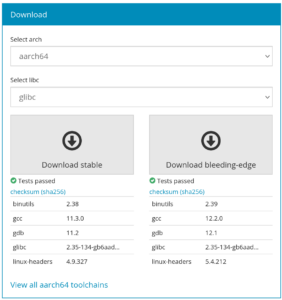 The toolchains.bootlin.com service provides freely available pre-compiled cross-compilation toolchains for a wide range of CPU architectures and configurations.
The toolchains.bootlin.com service provides freely available pre-compiled cross-compilation toolchains for a wide range of CPU architectures and configurations.
We have just published version 2022.08 of these toolchains, which are now built using Buildroot 2022.08. Thanks to this the toolchains now use the following components:
- The bleeding-edge toolchains are based on gcc 12, binutils 2.39, gdb 12, kernel headers 5.4, glibc 2.35 or musl 1.2.3 or uclibc-ng 1.0.42.
- The stable toolchains are based on gcc 11, binutils 2.38, gdb 11, kernel headers 4.9, glibc 2.35 or musl 1.2.3 or uclibc-ng 1.0.42.
Even though glibc 2.36 has been recently released, it still caused too many issues to be integrated in this toolchain release. glibc 2.36 will be part of a future update of these toolchains.
We also have a few new toolchains that appeared:
- Toolchains for the OpenRISC CPU architecture, based on the glibc C library. We already had toolchains for OpenRISC, but not using glibc.
- We now have both stable and bleeding-edge toolchains for the x86-64-v2, x86-64-v3 and x86-64-v4 architecture variants. We used to have only bleeding-edge toolchains for these variants as only the latest gcc had support for them.
The only toolchain that was not updated as part of this release is the m68k Coldfire toolchain, as we currently have a regression on elf2flt. This will hopefully be adressed in the future.
If you have feedback or encounter any issue in using these toolchains, the project issue tracker is where you should go.
Bootlin toolchains updated, 2021.11 release
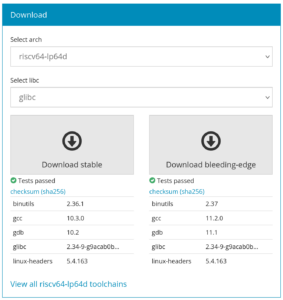 Bootlin has been offering since 2017 a large set of ready to use pre-compiled cross-compilation toolchains at toolchains.bootlin.com. These toolchains are available for a wide range of CPU architectures and CPU variants, and support either the glibc, uClibc-ng or musl C libraries, where applicable.
Bootlin has been offering since 2017 a large set of ready to use pre-compiled cross-compilation toolchains at toolchains.bootlin.com. These toolchains are available for a wide range of CPU architectures and CPU variants, and support either the glibc, uClibc-ng or musl C libraries, where applicable.
It’s been quite some time since the last release of those toolchains, so we took the opportunity of this quiet period between Christmas and New Year to finally update the toolchains. We’re happy to announce that we have now published a total of 187 toolchains targeting 46 different CPU architecture variants. As the toolchain release name suggests, they are now built with Buildroot 2021.11.
The most important changes are the following ones:
- The so-called stable toolchains are now based on gcc 10.3.0, binutils 2.36.1, Linux headers 4.9, gdb 10.2, glibc 2.34, uClibc 1.0.39 and musl 1.2.2
- The so-called bleeding-edge toolchains are now based on gcc 11.2, binutils 2.37, Linux headers 5.4, gdb 11.1, glibc 2.34, uClibc 1.0.39 and musl 1.2.2
- The riscv64 toolchains (targeting the LP64 ABI) have been replaced by riscv64-lp64d toolchains (targeting the LP64D ABI), making them more generally useful.
- Runtime testing using Qemu has been added for RISC-V 64-bit, m68k-68xxx and OpenRISC.
- The gdb cross-debugger is now compiled with both Python and TUI support.
- Internally, there’s been some significant refactoring of the scripts and Gitlab CI pipelines that control the build and testing of those toolchains. Many thanks to Romain Naour for providing the ground work that enabled this refactoring.
The toolchains can be directly downloaded from toolchains.bootlin.com. We have also submitted a patch to Buildroot that updates those toolchains, which are directly usable in Buildroot as external toolchains.
Bootlin toolchains updated, edition 2020.02
Bootlin provides a large number of ready-to-use pre-built cross-compilation toolchains at toolchains.bootlin.com. We announced the service in June 2017, and released multiple versions of the toolchains up to 2018.11.
After a long pause, we are happy to announce that we have released a new set of toolchains, built using Buildroot 2020.02, and therefore labelled as 2020.02, even though they have been published in April. They are available for 38 CPU architectures or architecture variants, supporting the glibc, uclibc-ng and musl C libraries when possible.
For each toolchain, we offer two variants: one called stable which uses “proven” versions of gcc, binutils and gdb, and one called bleeding edge which uses the latest version of gcc, binutils and gdb.
Overall, these 2020.02 toolchains use:
- gcc 8.4.0 for stable, 9.3.0 for bleeding edge
- binutils 2.32 for stable, 2.33.1 for bleeding edge
- gdb 8.2.1 for stable, 8.3 for bleeding edge
- linux headers 4.4.215 for stable, 4.19.107 for bleeding edge
- glibc 2.30
- uclibc-ng 1.0.32
- musl 1.1.24
In total, that’s 154 different toolchains that we are providing! If you are using these toolchains and face any issue, or want to request some additional change of feature, do not hesitate to contact us through the corresponding Github project. Also, I’d like to thank Romain Naour, from Smile for his contributions to this project.
Updated bleeding edge toolchains on toolchains.bootlin.com
Two months ago, we announced a new service from Bootlin: free and ready-to-use Linux cross-compilation toolchains, for a large number of architectures and C libraries, available at https://toolchains.bootlin.com/.
Bleeding edge toolchain updates
All our bleeding edge toolchains have been updated, with the latest version of the toolchain components:
- gcc 7.2.0, which was released 2 days ago
- glibc 2.26, which was released 2 weeks ago
- binutils 2.29
- gdb 8.0
Those bleeding edge toolchains are now based on Buildroot 2017.08-rc2, which brings a nice improvement: the host tools (gcc, binutils, etc.) are no longer linked statically against gmp, mpfr and other host libraries. They are dynamically linked against them with an appropriate rpath encoded into the gcc and binutils binaries to find those shared libraries regardless of the installation location of the toolchain.
However, due to gdb 8.0 requiring a C++11 compiler on the host machine (at least gcc 4.8), our bleeding edge toolchains are now built in a Debian Jessie system instead of Debian Squeeze, which means that at least glibc 2.14 is needed on the host system to use them.
The only toolchains for which the tests are not successful are the MIPS64R6 toolchains, due to the Linux kernel not building properly for this architecture with gcc 7.x. This issue has already been reported upstream.
Stable toolchain updates
We haven’t changed the component versions of our stable toolchains, but we made a number of fixes to them:
- The armv7m and m68k-coldfire toolchains have been rebuilt with a fixed version of elf2flt that makes the toolchain linker directly usable. This fixes building the Linux kernel using those toolchains.
- The mips32r5 toolchain has been rebuilt with NaN 2008 encoding (instead of NaN legacy), which makes the resulting userspace binaries actually executable by the Linux kernel, which expects NaN 2008 encoding on mips32r5 by default.
- Most mips toolchains for musl have been rebuilt, with Buildroot fixes for the creation of the dynamic linker symbolic link. This has no effect on the toolchain itself, but also the tests under Qemu to work properly and validate the toolchains.
Other improvements
We made a number of small improvements to the toolchains.bootlin.com site:
- Each architecture now has a page that lists all toolchain versions available. This allows to easily find a toolchain that matches your requirements (in terms of gcc version, kernel headers version, etc.). See All aarch64 toolchains for an example.
- We added a FAQ as well as a news page.
As usual, we welcome feedback about our toolchains, either on our bug tracker or by mail at info@bootlin.com.

